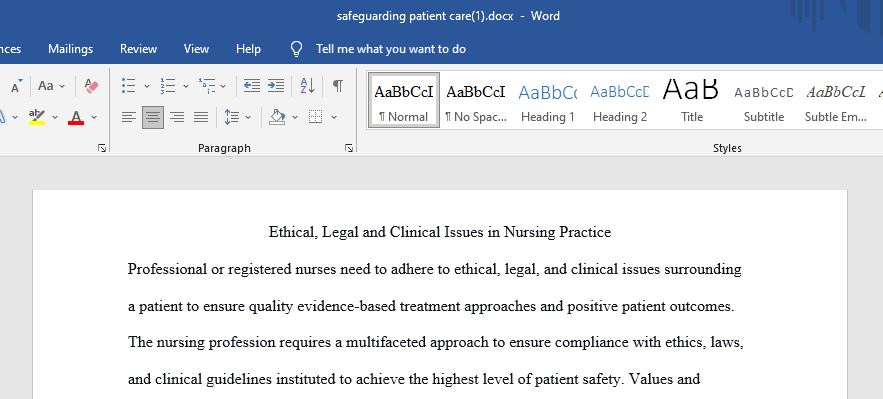Assessment 1: Safeguarding patient care
Assessment 1: Safeguarding patient care
This assignment examines the roles and responsibilities nurses have about making decisions about practice that aims to keep Australian healthcare patients safe. Reasons or grounds for justifying a person’s moral decisions and actions are generally thought to derive from three key sources:
(1) moral rules, principles and theories;
(2) lived experience and individual personal judgments; or
In preparation for the assessment task
- Read – The incidents that lead to Sophie Smithfield’s RN licence being suspended for 15 years
- Review – the associated relevant documents below (links within Module topics content page)
i. NMBA Registered Nurse Standards of Practice
ii. Code of Conduct
iii. Code of Ethics
3. Complete – the required work within modules Module 1, 2 & 4: attending all requirements of the module including readings, Zoom sessions, forums postings & group work.
The Case fo Ms Sophie Smithfield
|
Nurse administered wrong vaccines to children and doctored records, tribunal finds
|
|
A published judgement reveals she had “wrongly and deliberately deleted, or falsely altered, or made untrue entries” in the records of 17 patients while she was working as a registered nurse at Burberry Clinic in 2017-2018.
Ms Smithfield administered a child with the Inactivated poliovirus (IPV) vaccine against diphtheria, tetanus, pertussis and polio in January 2017.
She informed the Australian Childhood Immunisation Register (ACIR) that the vaccine had been given, but incorrectly stated on clinic records the vaccine given was MMR for measles, mumps and rubella.
Ms Smithfield administered the IPV vaccine for a second time when the child returned to the clinic weeks later, but the MMR vaccine was never injected.
The ACIR contacted the child’s parents about the vaccine months later.
When questioned about the discrepancy, Ms Smithfield “falsified the records to cover up her own mistake”.
“If the had not been discovered, the child would have remained unprotected against the diseases that the MMR guards against,” the judgement said. “The child’s parents would have been deceived into thinking that the child was properly immunised when that was not the case.”
A similar course of events was found to have taken place in the cases of two other children, who also had their records altered to hide the fact they had not received the MMR vaccine.
In the separate case of another child, Ms Smithfield administered only half of the correct dosage of flu vaccine and again changed the patient’s records to hide the error.
After two adult patients suffered adverse reactions to immunisations, Ms Smithfield altered their records to reflect that she had washed her hands before administering the vaccine and asked the patients to remain at the clinic for monitoring.
The clinic said it has taken steps to ensure, as far as possible, that any concerns about patient vaccines have now been followed up.
Key points:
|
Part 1 – Written Response (1500) 40 marks
Registered nurses, enrolled nurses and midwives are responsible for making professional judgements about when an activity is within or outside their ethical, legal and clinical requirements of practice. The purpose of this assessment is to develop your knowledge about nurses’ decisions or approaches to clinical practice about ethical, legal and clinical issues, and how nurses know to what is the right thing to adhere to in everyday professional practice.
Q. 1 Differentiate the ethical, legal and clinical issues presented relating to Ms Smithfield’s tribunal results. Using relevant codes and standards justify the differentiation of the issues.
Q. 2 Considering the differentiated issues presented in Q1, critically discuss how values and attitudes in practice impact the RNs roles and responsibilities in keeping patients safe. Support this discussion with current and relevant peer reviewed literature.
Part 2 – Reflect (approx. 500) 20 marks
You are a new graduate working on the same team as Ms Smithfield’s and through your own observation become aware of the issues presented before anyone has completed a formal report. While reflecting on how your values and attitudes impact on patient safety and your professional profile; having knowledge of this situation, discuss the impact or possible transformation of your professional practice. Ensure your reflection is linked to and flows logically from issues raised in part 1.
* You are expected to support all sections of this paper with quality references applicable to the Australian context.
Marking Rubric – Attached below
The marking rubric provided below shows the allocation of marks to the relevant questions and should be used as a guide for when you are preparing your assignment.
Please use appropriate in-text and end-text referencing from an appropriate scholarly source and APA version 7. The content of your report should contain information extracted from scholarly journals, books policies and professional standards (i.e. do not rely on Moodle learning notes, newspaper articles, or your personal experience).
Answer preview:

word limit:2242
